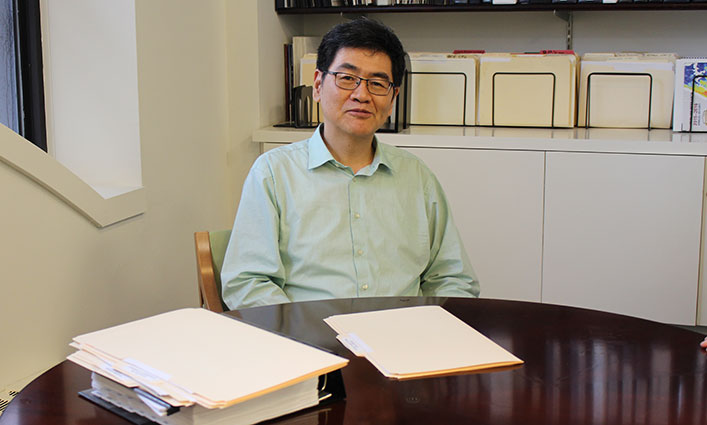
Recently, after an extensive national search, President Karol V. Mason announced the appointment of Dr. Yi Li as John Jay’s new Provost. To get to know Dr. Li a little better, we sat down with him to learn more about his past experiences and his hopes for the John Jay community.
Q: Why were you passionate about joining John Jay College?
YL: John Jay's model of educating for justice was really attractive and meaningful to me. I grew up during the Cultural Revolution, where like many families in China, my family suffered. I personally suffered from a lack of education. The graduating class from my high school only had a handful of students who were fortunate enough to get into a four-year college. Because of a lack of a college education, most of my high school classmates are already retired. I consider myself very fortunate to still be working and be able to help students and faculty.
Q: What are you biggest goals as the new Provost?
YL: What I realized during the interview process was how committed the faculty and staff are to their students’ success. My goal is to really support them, improving student retention and graduation rates. I’d like to help the faculty and staff provide a transformative experience for our students.
Q: What do you want students to know about you?
YL: I want students to know that in life, everyone goes through struggles. I want them to know that their Provost failed his first math class as a freshman. And, as a doctorate student in the Ph.D. program at the University of Minnesota, I failed my first qualifying exam. In life we make choices. You can call a fail a failure, or you can stand up and come back. Don't be afraid to fail and come back. That's the experience of life.
“In life we make choices. You can call a fail a failure, or you can stand up and come back. Don't be afraid to fail and come back. That's the experience of life.” —Provost Li
Q: You and President Mason were both Math majors in college. What else do the two of you connect on?
YL: I think we connected in multiple places. President Mason is very strong on social justice, and she wants to support our students, especially those who come from a disadvantaged background. That speaks so well to my own experience. I struggled to come to the U.S. and get my degree. I was under prepared. Fortunately, I was given strong support from my family and other people who were both wise and kind. This is who Karol is—she is strong on justice, and she is kind. This is where our connection is. Of course, we also talked about how we were both Math majors, and we’re both pretty good at numbers.
Q: Your experience during the Cultural Revolution in China significantly shaped your life. Can you tell us more about what that experience taught you?
YL: Throughout that period, my parents continued to be my role models, helping me form my core values and beliefs. My father would tell me to be optimistic, even during the most difficult times. And my mother taught me to stand up to those in power, but to treat those in need with care and kindness. During the Cultural Revolution I also learned about mentoring. I was mentored the entire time, even though I didn't realize it then. At John Jay we need to be mindful how we engage and mentor our students, junior staff, and faculty. That’s how I got through a difficult time in my life, with support, kindness, and mentoring.
“At John Jay we need to be mindful how we engage and mentor our students, junior staff and faculty. That’s how I got through a difficult time in my life, with support, kindness, and mentoring.” —Provost Li
Q: What does justice mean to you?
YL: Fundamentally, it's about fairness and equality. This is especially relevant in the current environment, where we are going to see—and this in not stoppable—that demographically there is going to be a titanic shift. And with that shift comes tremendous challenges. Currently, we have not been able to manage the gaps of higher education attainment between the “traditionally better served” and the “traditionally under-served.” That gap is widening. However, the population of the “traditionally better served” is getting smaller and the population of the “traditionally under served” is getting bigger. Unless we can actually move them and help them to get a four-year degree, we have a tremendous problem in terms of social mobility and in terms of moving people into the middle class. I believe that middle income is better for democracy. If we can't help them, it will not only be a social justice issue, but an issue of national security. Justice in this case is how we support our students, making sure students of color get through college.
Q: Can you tell us something surprising about yourself?
YL: I like to play video games. Typically, it’s the kind of video games that have historical backgrounds, or just ones for fun. The last video game I played was "God of War." In the summer, I'll try to set aside about a week where I'll do nothing but play video games. It all started because of my son. When he was in junior high, he played video games and I used to play with him. That's how I got hooked.



